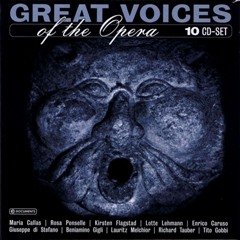Great Voices of the Opera (2011) CD7 - Beniamino Gigli
Great Voices of the Opera (2011) CD7 - Beniamino Gigli

7-1 –Beniamino Gigli Cavalleria Rusticana: Mama, Quel Vino è Generoso 4:06 7-2 –Beniamino Gigli Fedora: Amor Ti Vieta 2:08 7-3 –Beniamino Gigli La Favorita: Spirito Gentil 4:05 7-4 –Beniamino Gigli Iris: Apri la Tua Finestra 2:36 7-5 –Beniamino Gigli Le Roi D'Ys: Vainement Ma Bien Aimée 3:38 7-6 –Beniamino Gigli Andrea Chénier: Come Un Bel di 3:14 7-7 –Beniamino Gigli Il Canto Del Cigno 2:41 7-8 –Beniamino Gigli L'Elisir D'amore 3:06 7-9 –Beniamino Gigli Lucia di Lammermoor 5:13 7-10 –Beniamino Gigli La Traviata: Lunge Da Lei ... De'miei Bollenti Spiriti 4:27 7-11 –Beniamino Gigli La Gioconda: Cielo E Mar 4:50 7-12 –Beniamino Gigli Manon: O Dolce Incanto 3:44 7-13 –Beniamino Gigli Faust: Salve, Dimora Casta E Pura 4:55 7-14 –Beniamino Gigli Tosca: E Lucevan Le Stelle 3:11 7-15 –Beniamino Gigli L'Arlesiana: Laissez-moi Dire 4:24
The Italian tenor, Beniamino Gigli (March 20, 1890 - November 30, 1957), had received lessons from Agnese Bonucci, before he won a scholarship to the Liceo Musicale. His teachers were Cotogni and Enrico Rosati. In 1914 he won an international competition at Parma.
On October 14, 1914, Beniamino Gigli made a successful début in La Gioconda at Rovigo. In 1915 his Faust in Arrigo Boito's Mefistofele was highly appreciated at Bologna under Tullio Serafin and at Naples under Pietro Mascagni. Spain was the scene of his first successes abroad, in 1917. The climax of his early career was his appearance in the memorial performance of Mefistofele at La Scala November 19, 1918. On November 26, 1920 he made a brilliant début (again in Mefistofele) at the Metropolitan Opera in New York, where he remained as principal tenor for 12 consecutive seasons, singing no fewer than 28 of his total of 60 roles.
In the lyrical and romantic repertory, Beniamino Gigli was regarded as the legitimate heir of Caruso (Martinelli excelled in the more dramatic and heroic parts). The operas in which he was most often heard were La bohème, La Gioconda, L'Africaine, Andrea Chénier and Mefistofele. His Covent Garden début was in Andrea Chénier on May 27, 1930, with subsequent appearances in 1931, 1938 and 1946. In 1932 he left the Metropolitan, declining to accept a substantial reduction of the salary paid him before the Depression. Thereafter he pursued his career more actively in Italy, elsewhere in Europe, and in South America, returning to the Metropolitan, for five performances only, in 1939 . A favourite of Mussolini, Gigli was at first under a cloud after the dictator's fall, but returned to sing in Tosca at the Rome Opera in March 1945 , and in November 1946 reappeared at Covent Garden with the S Carlo company in La bohème, with his daughter, Rina Gigli, as Mimì. He continued to appear in opera at Naples and at Rome as late as 1953, and in concerts almost until his death.
Smoothness, sweetness and fluency were the outstanding marks of Beniamino Gigli's singing. His style was essentially popular, both in its virtues and its limitations: natural, vital and spontaneous on the one hand, but always liable to faults of taste - to a sentimental style of portamento, for instance, or the breaking of the line by sobs, or ostentatious bids for stage applause ‘like a picturesque beggar appealing for alms’ (Ernest Newman). He missed refinement in W.A. Mozart, and was unequal to the technical demands of ‘Il mio tesoro’; in Giuseppe Verdi he was more at home, although notably happier when, as in the second scene of Un ballo in maschera or the last act of Rigoletto, his grandees had adopted popular disguise; best of all in Giacomo Puccini and the melodramatic lyricism of Andrea Chénier and La Gioconda. His mellifluous cantilena in such pieces as Nadir's romance in Les pêcheurs de perles was consummately beautiful. Gigli was something less than a great artist; but as a singer pure and simple he was among the greatest.
His many recordings offer a complete portrait of his long career; outstandingly successful are the arias from Mefistofele, Martha, L'elisir d'amore, La Gioconda and Faust, duets with Giuseppe De luca from La forza del destino and Les pêcheurs de perles, and the complete recordings of Andrea Chénier and La Bohème. Gigli was also a seductively charming interpreter of Neapolitan and popular songs, and delighted 1930’s cinema audiences with his portrayals of ingenuous and lovestruck tenors. ---Desmond Shawe-Taylor / Alan Blyth, bach-cantatas.com
download (mp3 @320 kbs):
yandex mediafire ulozto cloudmailru gett








